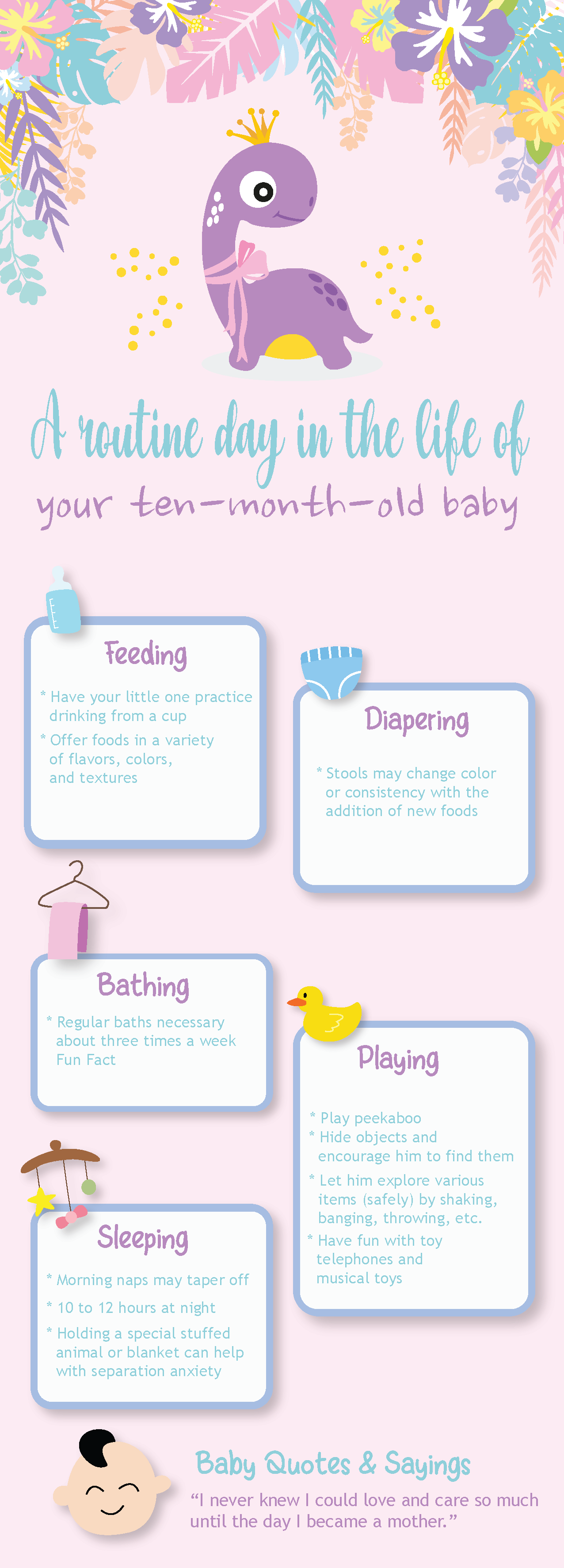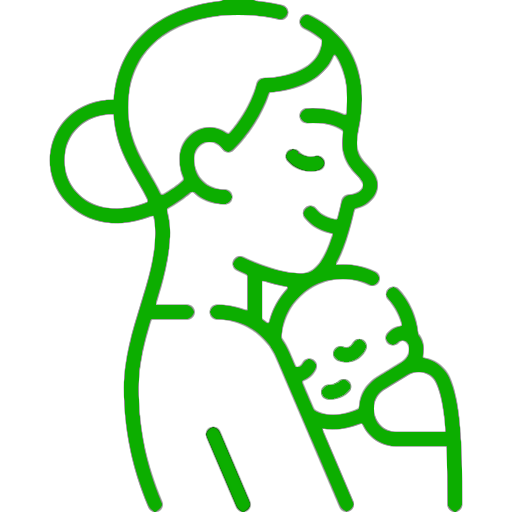Nothing beats watching your 10-Month-Old Baby take on new difficulties, from standing and then walking to attempting to pronounce his first actual words. You’re probably pleased with your child. You may still have questions about what to expect in the following weeks, such as what 10-month-old newborns can consume, how long they should sleep, and which developmental goals they generally achieve. We’ve got you covered for all of this and more, so keep reading!

Milestones in Infant Development
One of the ironies of your baby’s growth at 10 months is that, while he is anxious to become more mobile and independent, he may also be wary of straying too far away from you and may even cry when you are not in sight. Continue reading to find more about what your 10-month-old baby might be experiencing this month, including developmental milestones he might accomplish around this time.
Growth and Physical Development: Consistent Progress
Don’t get too attached to your baby’s favourite outfits! Your 10-month-old baby will most certainly continue to develop rapidly this month, nearly tripling his birth weight by his first birthday. All babies develop at their own pace, and there is no universal development benchmark for infants. Instead, at your baby’s frequent checks, the healthcare practitioner will record his weight, length, and head circumference to ensure he’s developing normally.
Movement: Up, Up, and Away!
You may have observed that when your baby is awake, he is always moving. He’ll arch his back to gaze around if he’s on his tummy, and clutch his toes if he’s on his back. He may also be rolling over or rocking on his hands and knees at times. All of these motions help to develop his muscles, enhance his coordination, and teach him about the capabilities of his various body parts.
Each baby is unique, however, your kid may be attempting to pull himself up to stand about this time. Seeing everyone else walk makes him want to do the same! When he stands, he may be concerned that he won’t be able to sit down again, which is more difficult. If you notice him struggling, show him how you bend your knees to return to the floor, and he might be able to mimic you.
When your baby is able to stand comfortably, he may take a few cautious steps while holding onto furniture. This is referred to as “cruising.” He’ll soon try a few tentative steps without clinging onto anything. This may result in him falling to the ground, but he will become more skilful with each attempt.
You might be amazed at how rapidly things are progressing now after months and months of tummy time and all those exercises aimed to build his muscles in preparation for walking. Once he takes those timid first steps, it may only be a few days before your baby is confidently walking. What a marvel!
Cognitive Development: Hello, Can You Hear Me?
Long before your baby can speak, he can understand what you’re saying. You may be amazed at how much newborns understand! For example, if you say the name of his favourite toy, he may turn toward it, indicating that he understands what you’re talking about. You can treat something he’s coined as his own if he’s invented his own word for it. For example, if he says “tata” to his favourite teddy, give it to him while saying “teddy” to reinforce the correct word. He’ll catch up eventually. Your infant will soon be able to pronounce simple words like “no,” “mama,” and “dada,” whether now or in the coming months.
Your child will soon begin to copy the way you use stuff. If he has a toy phone, he might put it to his ear like you do. Take advantage of his desire to imitate you by teaching him how to use objects. Allow him to “brush” his hair or his teeth with a hairbrush or a toothbrush. Allow him to practice using a cup and spoon during mealtimes.
How much technology do you use as a parent while your infant plays with the phone? If you have a minute, please take our short quiz to tell us about your experiences.
How to Encourage Your Child’s Development
As always, there are numerous things you may do to assist your baby’s growth and development. Here are a few suggestions to get you started:
- Put some strong, safe objects in a low drawer or cabinet for your baby to investigate and play with. Finding new things on his own excites him and will increase his confidence.
- Stairs may become appealing to your baby when he learns to pull himself up to a stand. Install baby gates for protection, but consider allowing him to use the lowest step under close supervision with you standing directly beneath him.
- Teach your child the actions associated with words such as “bye-bye,” “yes,” and “no.” Show him how to wave goodbye, nod yes, and shake his head no.
- Experts advise against using a baby walker with your child. These devices are hazardous and may reduce his motivation to walk. Consider a stationary walker, a play centre, or a push car with a bar he can grab.
- Your 10-month-old infant may be attracted by an empty box, an egg carton, or even a toilet paper tube that he can bend, rip, and scrunch. Toys for your 10-month-old infant should include a large doll or puppet, a toy telephone, or a “busy box” with features that squeak, push, move, open, and roll. These will assist in the development of his fine motor skills and hand-eye coordination.
A Day in the Life of Your Baby
Every baby is different, but here’s a glimpse of what a typical day could look like with your baby.

Feeding Your Ten-Month-Old Child
Your baby needs approximately 750 to 900 calories per day, with approximately half coming from breast milk or formula and the remainder from food. You can encourage your 10-month-old baby to feed himself by spoon-feeding him or letting him use a spoon. You can also give him finger foods. Small pieces of tofu or cheese, peas, sliced fruit, and well-cooked pasta are also good options. As he learns, try to be patient with his slow pace and the amount of food that ends up everywhere but in his mouth. The more you let him attempt, the more capable and confident he will become.
You could introduce your infant to the sippy cup around this time. Begin with a trainer cup, which comes with a lid, two handles, and a soft straw or spout. Your infant will initially treat it as a toy, which is just normal. Add some water and demonstrate how to drink from it to your baby, and he’ll soon begin to emulate you. Fill it with breast milk or formula instead of water over time.
Using the cup helps your baby’s hand-to-mouth coordination and prepares him for weaning from breastfeeding or bottle-feeding when the time comes. Keep in mind that it could be months before your baby drinks everything from a cup. For the time being, this is merely a friendly introduction – all newborns have to start somewhere.
Here’s an example of a 10-month-daily old’s menu, which includes both baby food and breast milk or formula. It also offers you an idea of how much baby food to feed your 10-month-old.
Eating Out With Your Child
Going out to eat with your newborn can be intimidating, but these suggestions may help:
- Call ahead of time to ensure that the restaurant is baby-friendly and provides a high chair. Take some baby wipes with you in case you need to clean the chair.
- Consider feeding your baby beforehand; he may fall asleep right away.
- Take your baby’s food, spoon, and bib if he will be dining with you.
- Don’t be embarrassed if your infant begins to cry. Instead, be adaptable and ready to either do some soothing or take the check early.
- Bring some soft toys and baby books for your child to play with without generating too much noise.
This page is based on professional advice from reputable medical and government organizations, such as the American Academy of Pediatrics and the American College of Obstetricians and Gynecologists. This page’s material should not be used in place of professional medical advice. For a complete diagnosis and treatment, always seek the advice of a medical expert.














Leave a Reply
View Comments